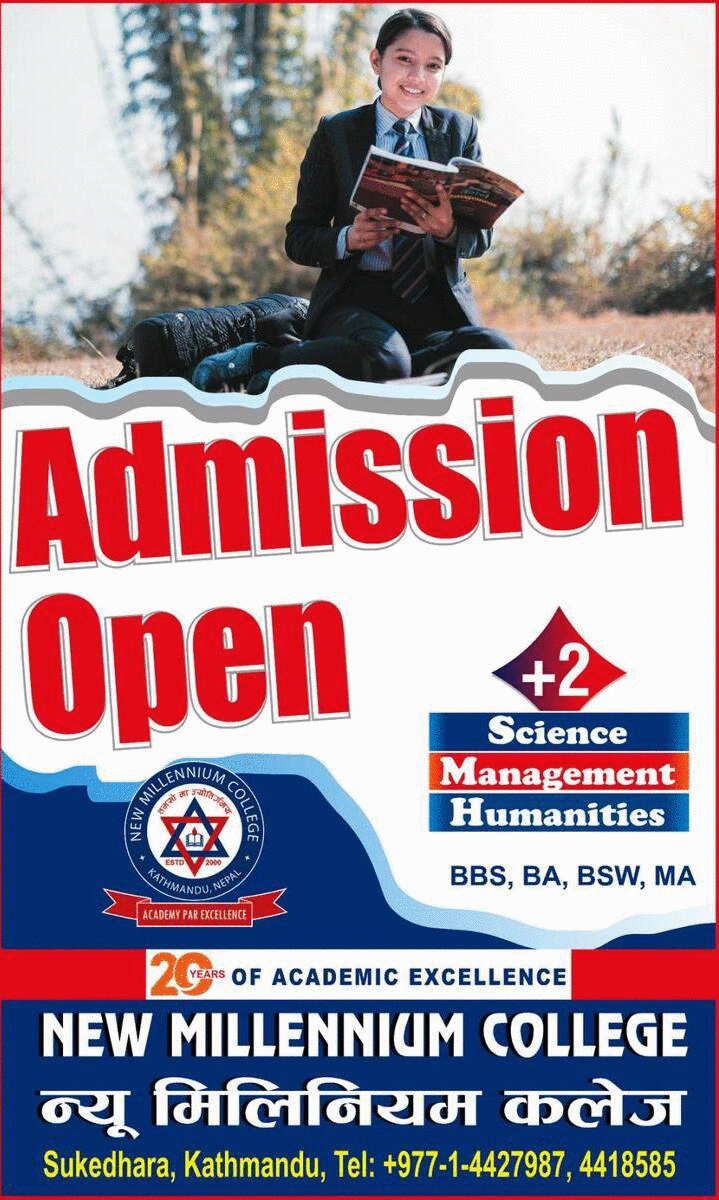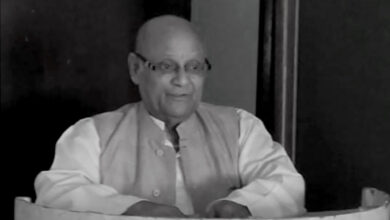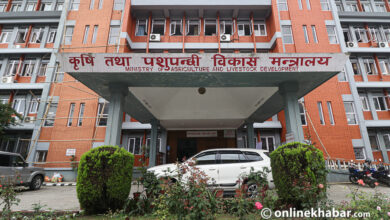The recent deepening of political crisis in ruling Nepal Communist Party (NCP) looks sudden but such incidents have been regularly occurring in Nepali political spectrum
Nov. 29, 2020, 1
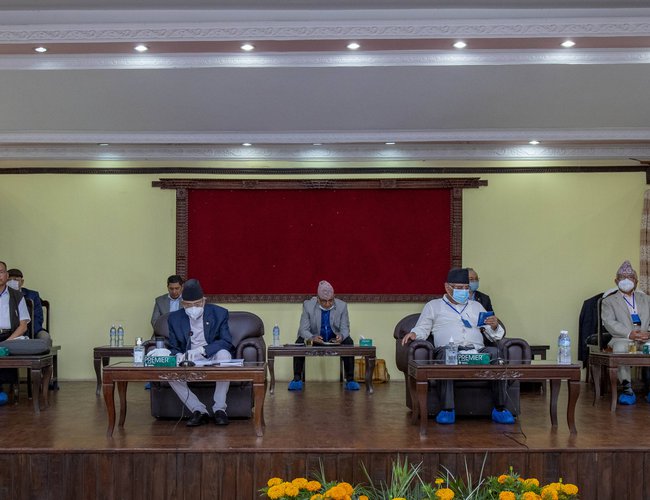
As prominent Nepali laurel, poet, dramatist and philosopher late Bal Krishna Shum said in his book Niyamit Akasmikata (Unexpected, Routine), every event looks unusual but routine. Nepalese politics has been passing through several such unusual but regular events.
For many, the sudden unification of the Communist Party of Nepal-Maoist and Communist Party of Nepal (Unified Marxist and Leninist) was puzzling. Similarly, the current deep crisis of the unified party is another shocking event in the emergency routine.
As they united in a dramatic and unusual manner, it will not be taken as shocking in case they break the party. This kind of abnormality is a normal practice in Nepali politics. Although several factors, internal and external, directly and indirectly, are playing different roles, one cannot rule out the possibility of the unity crumbling overnight.
As the internal dissension deepens in the ruling party, Prime Minister K.P. Sharma Oli reportedly held two hours of meeting with the leader of opposition Nepali Congress Sher Bahdur Deuba. This gave rise to speculations over the possibility of forming a new collation between Nepali Congress and PM Oli-led factions.
Prime Minister Oli’s meeting with Nepali Congress President leader Deuba has been interpreted by media outlets as the PM’s attempt to seek the main opposition party’s support to run a coalition government if the ruling Nepal Communist Party (NCP) splits.
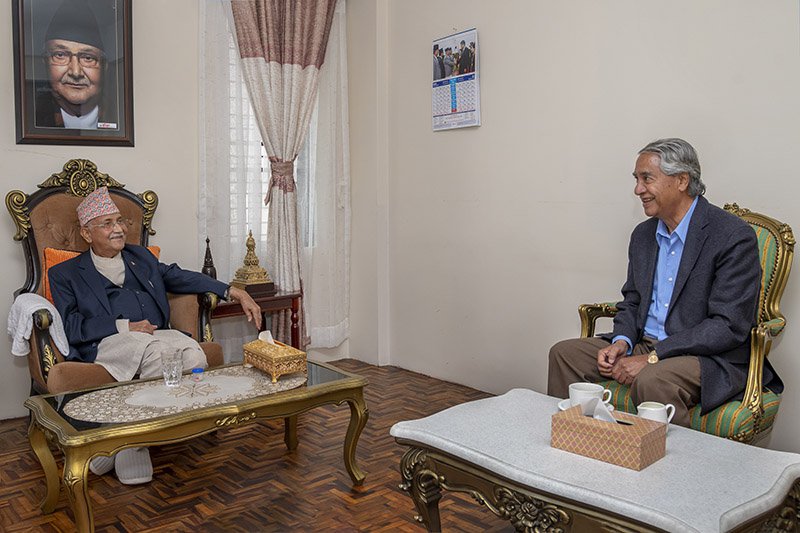 A war of words has escalated between the ruling party’s rival factions after NCP Co-chair Pushpa Kamal Dahal presented a 19-page proposal in the party Secretariat meeting accusing the PM of failing to run the government and the party. The Oli faction has dismissed Dahal’s proposal as a document of baseless allegations.
A war of words has escalated between the ruling party’s rival factions after NCP Co-chair Pushpa Kamal Dahal presented a 19-page proposal in the party Secretariat meeting accusing the PM of failing to run the government and the party. The Oli faction has dismissed Dahal’s proposal as a document of baseless allegations.
However, Chief Secretary of NC Secretariat Krishna Prasad Paudel said the talk of Oli discussing a possible alliance with the NC was just a rumor. “Our party is neutral in the NCP’s intra-party feud and is committed to shouldering the responsibility of the main opposition as mandated by voters.”
NC Spokesperson Bishwa Prakash Sharma tweeted that the NC would remain in the opposition and would not be enticed. He added that NC lawmakers were not part of any power equation.
What the two leaders aspired for during the meeting is yet to be public officially but it has sent the message that the government is in a fragile situation and it has lost the majority strength.
Oli And Prachanda
There is nothing in common between PM Oli and Prachanda but what is common between them is to form any kind of opportunistic alliance for political power.
When one sees the ideology, individual style and level of orientation, Prime Minister Oli and Prachanda led factions in the ruling party to have nothing in common.
In terms of personalities and party ideologies, the unification of ideologically radical Nepal Communist Party–Maoist and moderate left Communist Party of Nepal (Unified Marxist and Leninist) was itself unusual and illogical three years ago. However, both the parties moved overnight forward and decided not only to form a joint alliance but unify shortly.
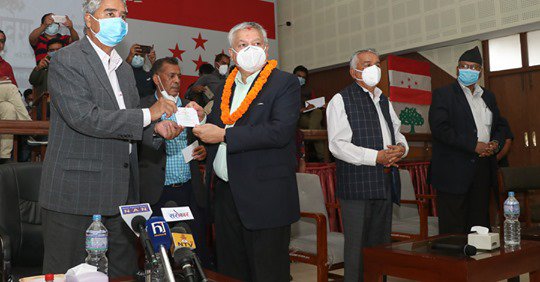
As the unification of the party under the leadership of Prime Minister Sharma Oli, who projected himself as a die-hard critic of Maoist, is politically unnatural, consent given by Prachanda, a die-hard critic of PM Oli, to be co-chair with a political rival was another puzzle.
The unification was itself a puzzling matter. However, there were euphoria among the cadres and leaders of both parties. It was shocking for Nepali Congress, which shared power and contested the local elections jointly with Prachanda led Maoists pulling down the government led by Oli.
Left, Right, Left
This is not the first political puzzle of Nepal. Since 1990, Nepalese have already seen many such political puzzles. During the 1990s, there were waves of a liberal democratic order which pulled down all communist governments and communist ideology had drastically declined with the fall of the Soviet Empire.
However, communist forces rose to the height in Nepali politics with support from Nepali Congress, a liberal and moderate democratic political party. Nepali Congress helped give international legitimacy and recognition to Nepal Communist Party.
The rise of communists in Nepal, at the cost of monarchy, a traditional force and republican force, was unusual. In just a matter of five years of overthrow of the monarchy led Panchayat, the first minority communist government was formed in Nepal.
The fall of the communist government has opened a series of experiments of communists, Nepali Congress and rightists-monarchist alliances. Although ideologically, they don’t have any closeness, there were left right, right left and right center alliances.
After launching the Maoist rebellion, the country has seen another political puzzle. Maoist leaders, who waged a violent insurgency against mainstream political parties, CPN-UML, Nepali Congress, RPP and monarchy, came to power with the support and alliance with Nepali Congress, CPN-UML and other left and right fringe parties through abrogation of the constitution of 1990 and monarchy.
Under the leadership of Nepali Congress leader late Girija Prasad Koirala, who was known as a die-hard anti-communist, Maoists came to the national mainstream making Nepal a completely red state.
In a matter of three decades of liberal political order, now communist parties are governing the country with a two-thirds majority in the central parliament and six out of seven provincial governments and over 70 percent local governments.
In the era of rising rights including in India with BJP in the center and several states, Nepal is under communist domination.
Everything looks unusual at that political context but every event looks to fit a usual order. However, Nepalese political parties have been constantly playing as a force of political instability in the country over the last 70 years.
Political instability, intrigues and massacres, started since the unification of Nepal and the death of the founder of Nepal Prithvi Narayan Shah, continue.
Dr. Bhttarai’s Move
Another strange alliance was a recent one. Dr. Baburam Bhattarai, former Maoist ideologue and key person responsible to draft the present constitution, joining Janata Samajbadi Party
With the call from Janata Samajbadi Party, more than 60 people in Madhesh sacrificed their life opposing the present constitution. There were blockades and mass rebellions against the constitution voted by Dr. Bhattarai, who is now the top leader of the party.
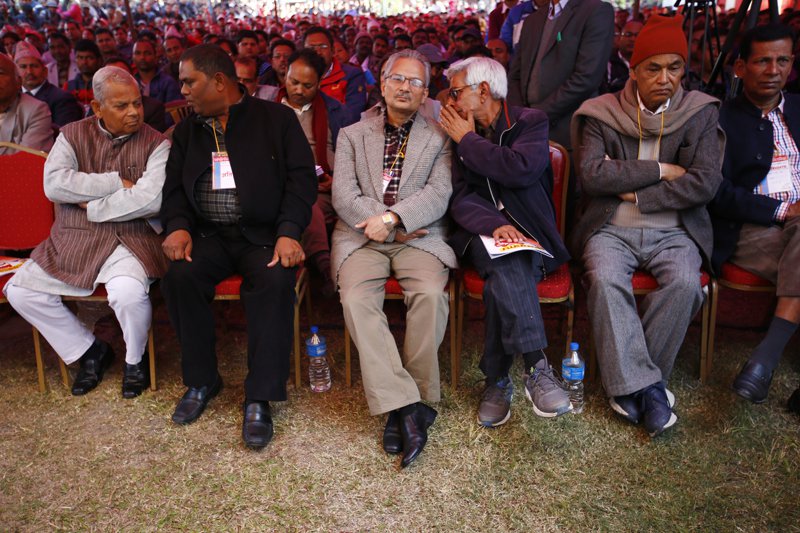 Current Dispute
Current Dispute
The internal bickering in the ruling party started a few months after the formation of the government. Settling several crises one after another, the current political scenario has reached another climax.
Following the tabulation of the 19-page document, Pushpa Kamal Dahal Prachanda had accused Oli of defying the power-sharing deal with him, ignoring party rules and decisions, and failing to run the party and the government.
This document has angered PM Oli. He immediately asked his henchmen to counter it. Upon PM Oli’s request, General Secretary Bishnu Poudel told Dahal to withdraw his proposal and seek resolution of issues on the basis of consensus.
PM Oli countered the allegations made against him by Dahal and the majority of members of the party Secretariat and sought 10 days to pen his rebuttal.
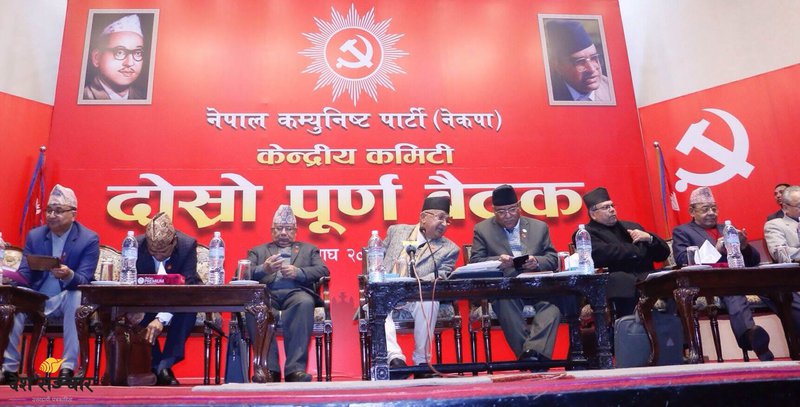
Deputy parliamentary party leader of the party Subash Chandra Nembang also met Dahal and told him that the best course of action for the party was to abide by the recent decisions of the party’s Standing Committee.
The Standing Committee had decided that Oli would complete his five-year term as PM and Dahal would act as the executive chairperson of the party as proposed by the six-member task force, ending the intra-party feud that had threatened party unity.
However, a war of words has heated up between the two leaders. While Dahal has accused Oli of defying party rules and decisions, inciting party lawmakers to file a no-trust motion against Karnali Chief Minister Mahendra Bahadur Shahi and making appointments to constitutional bodies without consulting party bodies, Oli has termed Dahal’s proposal as a document full of baseless accusations.
NCP Standing Committee Member and Chief Political Advisor to the Prime Minister Bishnu Rimal has claimed that the accusations leveled at party Chairman and PM KP Sharma Oli by another Chairman Pushpa Kamal Dahal ‘Prachanda’ were apolitical and impulsive.
At a time when the cadres and lower-rung leaders of the party are worried whether the party would split because of the intraparty feud, chief political advisor of PM Oli Bishnu Rimal viewed the accusations of Chairman Dahal as mere inhibitions.
After the discontents and accusations of Chairman Dahal and five other members of the Secretariat were made public, how PM and Chairman Oli will respond is a matter of curiosity for the party insiders and observers as well.
According to leader Rimal, if the weightage of the vote of then CPN (Maoist Centre) and CPN-UML were made the bases for unification, it could be 70:40 ratio to UML and Maoist Centre factions.
When the party unification was announced on May 17, 2018, it was also declared that party’s general convention would be held within two years and new leadership elected on the basis of consensus.
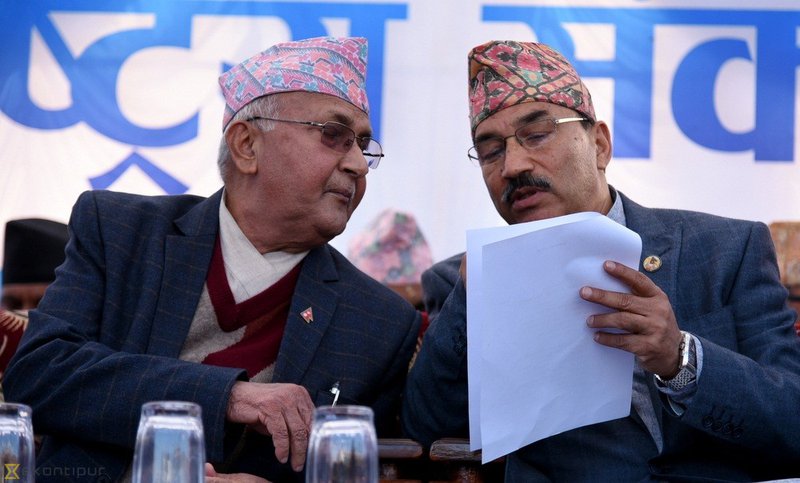 The government led by the Nepal Communist Party (NCP) with a solid majority is in problem due to a prolonged intra-party feud. The unification of the largest two left parties CPN-UML and CPN-Maoist Centre and their subsequent victory in the elections of the federal parliament and provincial assemblies had created hope for political stability that would ultimately create a favorable environment for social and economic development. But the party integration couldn’t work as expected since the top leadership did not live up to their promises and self-interest prevailed.
The government led by the Nepal Communist Party (NCP) with a solid majority is in problem due to a prolonged intra-party feud. The unification of the largest two left parties CPN-UML and CPN-Maoist Centre and their subsequent victory in the elections of the federal parliament and provincial assemblies had created hope for political stability that would ultimately create a favorable environment for social and economic development. But the party integration couldn’t work as expected since the top leadership did not live up to their promises and self-interest prevailed.
Although the present political crisis reaches the climax and it looks PM Oli faction and Prachanda faction are in a point of no return, one cannot rule out the possibility that the feud will end in a fiasco.
For many, the sudden unification of the Communist Party of Nepal-Maoist and Communist Party of Nepal (Unified Marxist and Leninist) was puzzling. Similarly, the current deep crisis of the unified party is another shocking event in the emergency routine.
As they united in a dramatic and unusual manner, it will not be taken as shocking in case they break the party. This kind of abnormality is a normal practice in Nepali politics. Although several factors, internal and external, directly and indirectly, are playing different roles, one cannot rule out the possibility of the unity crumbling overnight.
As the internal dissension deepens in the ruling party, Prime Minister K.P. Sharma Oli reportedly held two hours of meeting with the leader of opposition Nepali Congress Sher Bahdur Deuba. This gave rise to speculations over the possibility of forming a new collation between Nepali Congress and PM Oli-led factions.
Prime Minister Oli’s meeting with Nepali Congress President leader Deuba has been interpreted by media outlets as the PM’s attempt to seek the main opposition party’s support to run a coalition government if the ruling Nepal Communist Party (NCP) splits.
 A war of words has escalated between the ruling party’s rival factions after NCP Co-chair Pushpa Kamal Dahal presented a 19-page proposal in the party Secretariat meeting accusing the PM of failing to run the government and the party. The Oli faction has dismissed Dahal’s proposal as a document of baseless allegations.
A war of words has escalated between the ruling party’s rival factions after NCP Co-chair Pushpa Kamal Dahal presented a 19-page proposal in the party Secretariat meeting accusing the PM of failing to run the government and the party. The Oli faction has dismissed Dahal’s proposal as a document of baseless allegations.However, Chief Secretary of NC Secretariat Krishna Prasad Paudel said the talk of Oli discussing a possible alliance with the NC was just a rumor. “Our party is neutral in the NCP’s intra-party feud and is committed to shouldering the responsibility of the main opposition as mandated by voters.”
NC Spokesperson Bishwa Prakash Sharma tweeted that the NC would remain in the opposition and would not be enticed. He added that NC lawmakers were not part of any power equation.
What the two leaders aspired for during the meeting is yet to be public officially but it has sent the message that the government is in a fragile situation and it has lost the majority strength.
Oli And Prachanda
There is nothing in common between PM Oli and Prachanda but what is common between them is to form any kind of opportunistic alliance for political power.
When one sees the ideology, individual style and level of orientation, Prime Minister Oli and Prachanda led factions in the ruling party to have nothing in common.
In terms of personalities and party ideologies, the unification of ideologically radical Nepal Communist Party–Maoist and moderate left Communist Party of Nepal (Unified Marxist and Leninist) was itself unusual and illogical three years ago. However, both the parties moved overnight forward and decided not only to form a joint alliance but unify shortly.

As the unification of the party under the leadership of Prime Minister Sharma Oli, who projected himself as a die-hard critic of Maoist, is politically unnatural, consent given by Prachanda, a die-hard critic of PM Oli, to be co-chair with a political rival was another puzzle.
The unification was itself a puzzling matter. However, there were euphoria among the cadres and leaders of both parties. It was shocking for Nepali Congress, which shared power and contested the local elections jointly with Prachanda led Maoists pulling down the government led by Oli.
Left, Right, Left
This is not the first political puzzle of Nepal. Since 1990, Nepalese have already seen many such political puzzles. During the 1990s, there were waves of a liberal democratic order which pulled down all communist governments and communist ideology had drastically declined with the fall of the Soviet Empire.
However, communist forces rose to the height in Nepali politics with support from Nepali Congress, a liberal and moderate democratic political party. Nepali Congress helped give international legitimacy and recognition to Nepal Communist Party.
The rise of communists in Nepal, at the cost of monarchy, a traditional force and republican force, was unusual. In just a matter of five years of overthrow of the monarchy led Panchayat, the first minority communist government was formed in Nepal.
The fall of the communist government has opened a series of experiments of communists, Nepali Congress and rightists-monarchist alliances. Although ideologically, they don’t have any closeness, there were left right, right left and right center alliances.
After launching the Maoist rebellion, the country has seen another political puzzle. Maoist leaders, who waged a violent insurgency against mainstream political parties, CPN-UML, Nepali Congress, RPP and monarchy, came to power with the support and alliance with Nepali Congress, CPN-UML and other left and right fringe parties through abrogation of the constitution of 1990 and monarchy.
Under the leadership of Nepali Congress leader late Girija Prasad Koirala, who was known as a die-hard anti-communist, Maoists came to the national mainstream making Nepal a completely red state.
In a matter of three decades of liberal political order, now communist parties are governing the country with a two-thirds majority in the central parliament and six out of seven provincial governments and over 70 percent local governments.
In the era of rising rights including in India with BJP in the center and several states, Nepal is under communist domination.
Everything looks unusual at that political context but every event looks to fit a usual order. However, Nepalese political parties have been constantly playing as a force of political instability in the country over the last 70 years.
Political instability, intrigues and massacres, started since the unification of Nepal and the death of the founder of Nepal Prithvi Narayan Shah, continue.
Dr. Bhttarai’s Move
Another strange alliance was a recent one. Dr. Baburam Bhattarai, former Maoist ideologue and key person responsible to draft the present constitution, joining Janata Samajbadi Party
With the call from Janata Samajbadi Party, more than 60 people in Madhesh sacrificed their life opposing the present constitution. There were blockades and mass rebellions against the constitution voted by Dr. Bhattarai, who is now the top leader of the party.
 Current Dispute
Current DisputeThe internal bickering in the ruling party started a few months after the formation of the government. Settling several crises one after another, the current political scenario has reached another climax.
Following the tabulation of the 19-page document, Pushpa Kamal Dahal Prachanda had accused Oli of defying the power-sharing deal with him, ignoring party rules and decisions, and failing to run the party and the government.
This document has angered PM Oli. He immediately asked his henchmen to counter it. Upon PM Oli’s request, General Secretary Bishnu Poudel told Dahal to withdraw his proposal and seek resolution of issues on the basis of consensus.
PM Oli countered the allegations made against him by Dahal and the majority of members of the party Secretariat and sought 10 days to pen his rebuttal.

Deputy parliamentary party leader of the party Subash Chandra Nembang also met Dahal and told him that the best course of action for the party was to abide by the recent decisions of the party’s Standing Committee.
The Standing Committee had decided that Oli would complete his five-year term as PM and Dahal would act as the executive chairperson of the party as proposed by the six-member task force, ending the intra-party feud that had threatened party unity.
However, a war of words has heated up between the two leaders. While Dahal has accused Oli of defying party rules and decisions, inciting party lawmakers to file a no-trust motion against Karnali Chief Minister Mahendra Bahadur Shahi and making appointments to constitutional bodies without consulting party bodies, Oli has termed Dahal’s proposal as a document full of baseless accusations.
NCP Standing Committee Member and Chief Political Advisor to the Prime Minister Bishnu Rimal has claimed that the accusations leveled at party Chairman and PM KP Sharma Oli by another Chairman Pushpa Kamal Dahal ‘Prachanda’ were apolitical and impulsive.
At a time when the cadres and lower-rung leaders of the party are worried whether the party would split because of the intraparty feud, chief political advisor of PM Oli Bishnu Rimal viewed the accusations of Chairman Dahal as mere inhibitions.
After the discontents and accusations of Chairman Dahal and five other members of the Secretariat were made public, how PM and Chairman Oli will respond is a matter of curiosity for the party insiders and observers as well.
According to leader Rimal, if the weightage of the vote of then CPN (Maoist Centre) and CPN-UML were made the bases for unification, it could be 70:40 ratio to UML and Maoist Centre factions.
When the party unification was announced on May 17, 2018, it was also declared that party’s general convention would be held within two years and new leadership elected on the basis of consensus.
 The government led by the Nepal Communist Party (NCP) with a solid majority is in problem due to a prolonged intra-party feud. The unification of the largest two left parties CPN-UML and CPN-Maoist Centre and their subsequent victory in the elections of the federal parliament and provincial assemblies had created hope for political stability that would ultimately create a favorable environment for social and economic development. But the party integration couldn’t work as expected since the top leadership did not live up to their promises and self-interest prevailed.
The government led by the Nepal Communist Party (NCP) with a solid majority is in problem due to a prolonged intra-party feud. The unification of the largest two left parties CPN-UML and CPN-Maoist Centre and their subsequent victory in the elections of the federal parliament and provincial assemblies had created hope for political stability that would ultimately create a favorable environment for social and economic development. But the party integration couldn’t work as expected since the top leadership did not live up to their promises and self-interest prevailed.Although the present political crisis reaches the climax and it looks PM Oli faction and Prachanda faction are in a point of no return, one cannot rule out the possibility that the feud will end in a fiasco.
